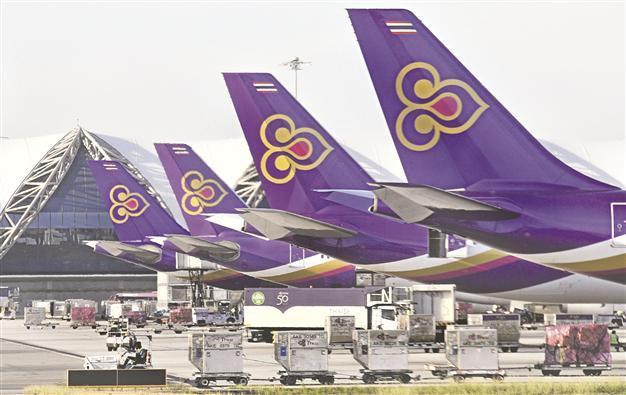Global airline profits thin this year due to oil prices and crisis
BEIJING - The Associated Press

A picture made available yesterday shows Thai Airways planes at the Suvarnabhumi airport in Bangkok, Thailand. The IATA has started it’s Annual General Meeting in Beijing, China. EPA Photo
Squeezed by high oil prices, the world airline industry’s profit will be slim this year and could be wiped out if Europe tumbles into recession, the global aviation trade group said yesterday.The International Air Transport Association called for governments to resolve a dispute over European carbon charges on airlines and to avoid tax and regulatory changes it said might hamper industry growth.
Worldwide, airlines should make total profits this year of $3 billion on revenues of $631 billion - a 0.5 percent margin, the IATA said in an industry outlook released as it opened its annual general meeting in Beijing.
“The industry’s profitability is balancing on a knife edge,” said the IATA’s executive director, Tony Tyler.
The “most immediate risk” is Europe’s debt crisis, which could drag down profits if it triggers a recession, Tyler said. He said a 1 percent drop in airline revenue could turn the small forecast global profit into a $3 billion loss.
Asian carriers are forecast to post total profits of $2 billion this year, while U.S. and Middle Eastern airlines also should make money, the IATA said. It said European carriers were expected to post a $1.1 billion loss. High oil prices are a key reason for weak profits, Tyler said.
The group represents 240 airlines including the world’s major carriers.
The latest outlook is based on a forecast that oil prices will average $110 a barrel this year. IATA says fuel accounts for 33 percent of carriers’ costs, up from 13-14 percent a decade ago.
The profit forecast represents a decline of more than 50 percent from last year’s $7.9 billion. That was down by a similar margin from 2010’s $15.8 billion profit.
Also yesterday, IATA appealed to governments to head off a mounting conflict over European carbon charges on airlines by negotiating a global system to regulate the industry’s emissions of climate-changing gases.
China, the United States, India, Russia and others oppose the European charges, which took effect Jan. 1 and require carriers to buy permits to emit carbon. China and India have prohibited their airlines from cooperating and Beijing has blocked purchases of European aircraft by its carriers, stirring fears of further economic retaliation.
Chinese opposition
“We strongly oppose this unilateral action,” said Wang Changshun, chairman of Air China, one of China’s three main state-owned carriers, at a news conference with Tyler.
Aviation accounts for 3 percent of total carbon emissions but is the fastest-growing source.
Talks on a global system have begun in the International Civil Aviation Organization and the European Union has said it would be willing to reconsider its system if an agreement is reached.
“It should be a global system,” said IATA chairman Peter Hartman, president of Dutch carrier KLM, at the news conference.
“We are not opposing (regulation of carbon emissions), but we are opposing that they try to force other continents under their legislation,” Hartman said.
The group appealed to governments to repeal taxes such as a new British passenger charge that it said hamper industry growth. It called for action on other issues such as delays in expanding airport capacity in Sydney and India’s business capital, Mumbai.
“Aviation should be seen by governments as a source of economic growth, but not as a cash cow,” Tyler said. “Using it wisely will deliver benefits throughout the economy.”
China to build 70 airports
BEIJING – Agence France-Presse
China will build 70 new airports within the next three years, the head of the country’s aviation watchdog said yesterday, as part of ambitious expansion plans in the industry despite an economic slowdown.
Civil Aviation Administration of China (CAAC) chief Li Jiaxiang also reiterated pledges that carriers would buy on average more than 300 planes a year from 2011 to 2015 -- the country’s current five-year economic plan.
“China plans to build 70 new airports in the next few years and to expand 100 existing airports,” he told delegates in Beijing at the annual general meeting of global airline industry group IATA.
He added that the number of airports would reach more than 230 by the end of 2015, and that Chinese carriers would operate around 4,700 planes by then.
The aggressive expansion comes after IATA head Tony Tyler warned that global airline profits would more than halve this year on the back of surging oil prices and the eurozone crisis.
The airline industry in the Asia-Pacific region is expected to turn in a $2 billion profit in 2012, according to IATA figures released on the sidelines of the AGM, but this still represents less than half of the region’s 2011 profit.
TURKISH AIRLINES FLY TO YANBU
ISTANBUL – Anatolia News Agency
Turkey’s national air carrier Turkish Airlines has launched flights to Saudi Arabian city of Yanbu, its fifth destination in the Arabic country.
In a written statement released yesterday, the airline noted that it also continues to fly to other Saudi Arabian cities of Riyadh, Jeddah, Medina and Dammam. Turkish Airlines flights to Yanbu will be conducted by Airbus A320 and Boeing 737 jets on Tuesdays, Thursdays and Saturdays. Turkish Airlines operates flights to 150 international and 41 domestic airports, serving a total of 187 airports, in Europe, Asia, Africa, and the Americas.
















